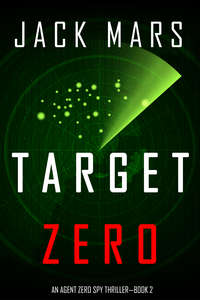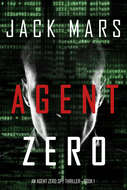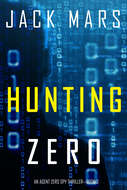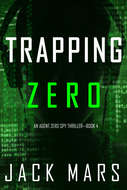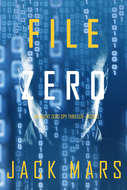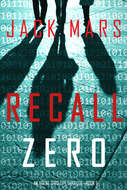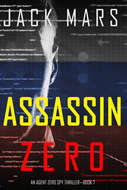Kitobni o'qish: «Target Zero»
Jack Mars
Jack Mars is the USA Today bestselling author of the LUKE STONE thriller series, which includes seven books. He is also the author of the new FORGING OF LUKE STONE prequel series, comprising three books (and counting); and of the AGENT ZERO spy thriller series, comprising six books (and counting).
Jack loves to hear from you, so please feel free to visit www.Jackmarsauthor.com to join the email list, receive a free book, receive free giveaways, connect on Facebook and Twitter, and stay in touch!
Copyright © 2019 by Jack Mars. All rights reserved. Except as permitted under the U.S. Copyright Act of 1976, no part of this publication may be reproduced, distributed or transmitted in any form or by any means, or stored in a database or retrieval system, without the prior permission of the author. This ebook is licensed for your personal enjoyment only. This ebook may not be re-sold or given away to other people. If you would like to share this book with another person, please purchase an additional copy for each recipient. If you’re reading this book and did not purchase it, or it was not purchased for your use only, then please return it and purchase your own copy. Thank you for respecting the hard work of this author. This is a work of fiction. Names, characters, businesses, organizations, places, events, and incidents either are the product of the author’s imagination or are used fictionally. Any resemblance to actual persons, living or dead, is entirely coincidental.
BOOKS BY JACK MARS
LUKE STONE THRILLER SERIES
ANY MEANS NECESSARY (Book #1)
OATH OF OFFICE (Book #2)
SITUATION ROOM (Book #3)
OPPOSE ANY FOE (Book #4)
PRESIDENT ELECT (Book #5)
OUR SACRED HONOR (Book #6)
HOUSE DIVIDED (Book #7)
FORGING OF LUKE STONE PREQUEL SERIES
PRIMARY TARGET (Book #1)
PRIMARY COMMAND (Book #2)
PRIMARY THREAT (Book #3)
AN AGENT ZERO SPY THRILLER SERIES
AGENT ZERO (Book #1)
TARGET ZERO (Book #2)
HUNTING ZERO (Book #3)
TRAPPING ZERO (Book #4)
FILE ZERO (Book #5)
RECALL ZERO (Book #6)
Agent Zero – Book 1 Summary (recap sheet to be included in book 2)
A college professor and father of two rediscovers his forgotten past as a CIA field agent. He fights his way across Europe to find the answer of why his memory was suppressed while unraveling a terrorist plot to kill dozens of world leaders
Agent Zero: Professor Reid Lawson was kidnapped and an experimental memory suppressor was torn from his head, allowing his forgotten memories to return as CIA Agent Kent Steele, also known the world over as Agent Zero.
Maya and Sara Lawson: Reid’s two teenage daughters, ages 16 and 14 respectively, are unaware of their father’s past as a CIA agent.
Kate Lawson: Reid’s wife and the mother of his two children passed away suddenly two years earlier from an ischemic stroke.
Agent Alan Reidigger: Kent Steele’s best friend and fellow field agent, Reidigger helped him have the memory suppressor installed in the wake of a deadly rampage by Steele to track down a dangerous assassin.
Agent Maria Johansson: A fellow field agent and Kent Steele’s former love interest in the wake of his wife’s death, Johansson proved an unlikely but welcome ally as he recovered his memory and unearthed the terrorist plot.
Amun: The terrorist organization Amun is an amalgamation of several terrorist factions from around the world. Their masterstroke of bombing the World Economic Forum at Davos while authorities are distracted by the Winter Olympics was thwarted by Agent Zero.
Rais: An American expat turned assassin of Amun, Rais believes it is his destiny to kill Agent Zero. In their fight at the Winter Olympics at Sion, Switzerland, Rais was mortally wounded and left for dead.
Agent Vicente Baraf: Baraf, an Italian Interpol agent, was instrumental in helping Agents Zero and Johansson to stop Amun’s plot to bomb Davos.
Agent John Watson: A stoic and professional CIA agent, Watson rescued Reid’s girls from the hands of terrorists on a New Jersey pier.
PROLOGUE
“Tell me, Renault,” said the older man. His eyes twinkled as he watched the coffee bubble in the cap of the percolator between them. “Why did you come here?”
Dr. Cicero was a kind man, jovial, the sort who liked to describe himself as “fifty-eight years young.” His beard had turned gray in his late thirties and white in his forties, and though usually neatly trimmed, it had grown wispy and unruly in his time on the tundra. He wore a bright orange parka, but it did little to mute the youthful light in his blue eyes.
The young Frenchman was slightly taken aback by the question, but he knew his answer immediately, having rehearsed it in his head many times. “The WHO contacted the university for research assistants. They, in turn, offered it to me,” he explained in English. Cicero was native Greek, and Renault from the southern coast of France, so they conversed in a shared tongue. “To be honest, there were two others given the chance before me. They both turned it down. However, I saw it as a great opportunity to—”
“Bah!” the older man interjected with a simper. “I’m not asking about academics, Renault. I’ve read your transcript, as well as your thesis on forecasted influenza B mutation. It was quite good, I might add. I don’t think I could have written it better myself.”
“Thank you, sir.”
Cicero chuckled. “Save your ‘sir’ for boardrooms and fundraising. Out here, we are equal. Call me Cicero. How old are you, Renault?”
“Twenty-six, sir—uh, Cicero.”
“Twenty-six,” said the old man thoughtfully. He warmed his hands over the heat from the camp stove. “And nearly finished with your doctorate? That’s very impressive. But what I want to know is, why are you here? As I said, I’ve reviewed your file. You’re young, intelligent, admittedly handsome…” Cicero chuckled. “You could have gotten an internship anywhere in the world, I imagine. But these four days you’ve been with us, I haven’t heard you once talk about yourself. Why here, of all places?”
Cicero waved a hand as if to demonstrate his point, but it was wholly unnecessary. The Siberian tundra stretched in every direction as far as the eye could see, gray and white and utterly empty, save for the northeast where low-lying mountains sprawled lazily, capped in white.
Renault’s cheeks turned slightly pink. “Well, if I am being honest, Doctor, I came here to study by your side,” he admitted. “I am an admirer of yours. Your work in hindering the Zika virus outbreak was truly inspiring.”
“Well!” said Cicero warmly. “Flattery will get you everywhere—or at least some Belgian dark roast.” He pulled a thick mitten over his right hand, lifted the percolator from the butane-powered camp stove, and poured two plastic mugs of steaming, rich coffee. It was one of the very few luxuries they had available in the Siberian wilderness.
Home, for the last twenty-seven days of Dr. Cicero’s life, had been the small encampment established about a hundred and fifty meters from the shore of the Kolyma River. The settlement was comprised of four domed neoprene tents, a canvas canopy enclosed on one side to protect from the wind, and a semi-permanent Kevlar clean room. It was under the canvas canopy that the two men currently stood, making coffee over a two-burner camp stove amid the folding tables that held microscopes, samples of permafrost, archaeology equipment, two rugged all-weather computers, and a centrifuge.
“Drink up,” said Cicero. “It’s nearly time for our shift.” He sipped the coffee with his eyes closed, and a soft moan of pleasure escaped his lips. “Reminds me of home,” he said softly. “Do you have someone waiting for you, Renault?”
“I do,” answered the young man. “My Claudette.”
“Claudette,” Cicero repeated. “A lovely name. Married?”
“No,” Renault said simply.
“It’s important to have something to long for, in our line of work,” said Cicero wistfully. “It gives you perspective amid the detachment that is often necessary. Thirty-three years I’ve called Phoebe my wife. My work has taken me all over this earth, but she is always there for me when I return. While I’m away, I pine, but it is worth it; every time I come home it is like falling in love all over again. As they say, absence makes the heart grow fonder.”
Renault grinned. “I would not have pegged a virologist for a romantic,” he mused.
“The two are not mutually exclusive, my boy.” The doctor frowned slightly. “And yet… I don’t believe it is Claudette that haunts your mind most. You’re a pensive young man, Renault. More than once I’ve noticed you staring at the mountaintop as if looking for answers.”
“I think you may have missed your true calling, Doctor,” said Renault. “You should have been a sociologist.” The smile dissipated from his lips as he added, “You are right, though. I have accepted this assignment not only for the ability to work at your side, but also because I have dedicated myself to a cause… a cause predicated on belief. However, I have fears of where that belief might take me.”
Cicero nodded knowingly. “As I said, detachment is often necessary in our line of work. One must learn to be dispassionate.” He put a hand on the young man’s shoulder. “Take it from someone with some years behind him. Belief is a powerful motivation, to be certain, but sometimes emotions have the tendency to blur our judgment, dull our minds.”
“I’ll be wary. Thank you, sir.” Renault grinned sheepishly. “Cicero. Thank you.”
Suddenly the walkie-talkie squawked intrusively from the table beside them, shattering the introspective silence of the canopy.
“Dr. Cicero,” said a female voice edged with an Irish brogue. It was Dr. Bradlee, calling from the nearby excavation site. “We’ve unearthed something. You’re going to want to see this. Bring the box. Over.”
“We’ll be there momentarily,” Dr. Cicero said into the radio. “Over.” He smiled paternally at Renault. “It seems we’re being called in early. We should suit up.”
The pair of men set down the still-steaming mugs and hurried to the Kevlar clean room, stepping into the first antechamber to dress in the bright yellow decontamination suits the World Health Organization had provided. Gloves and plastic boots went on first, sealed at the wrists and ankles, before the full-body coveralls, hood, and finally, mask and respirator.
They dressed quickly but quietly, almost reverently, using the brief interim as not only one of physical transformation, but mental as well, from their pleasant and casual banter to the somber mindset required for their line of work.
Renault disliked the decontamination suits. They made movement slow and the work tedious. But they were absolutely necessary to conduct their research: locate and verify one of the most dangerous organisms known to mankind.
He and Cicero stepped out of the antechamber and made their way toward the bank of the Kolyma, the slow-moving icy river that ran south of the mountains and slightly east, toward the ocean.
“The box,” said Renault suddenly. “I’ll fetch it.” He hurried back to the canopy to retrieve the sample container, a stainless steel cube fastened shut with four clasps, a biohazard symbol emblazoned on each of its six sides. He trotted back to Cicero, and the two resumed their hasty trek to the excavation site.
“You know what occurred not far from here, yes?” Cicero asked through his respirator as they walked.
“I do.” Renault had read the report. Five months ago, a twelve-year-old boy from a local village had fallen sick shortly after fetching water from the Kolyma. At first it was thought that the river was contaminated, but as symptoms manifested, the picture became clearer. Researchers from the WHO were mobilized immediately upon hearing of the illness and an investigation was launched.
The boy had contracted smallpox. More specifically, he had fallen ill with a strain never before seen by modern man.
The investigation eventually led to the carcass of a caribou near the river’s banks. After thorough testing, the hypothesis was confirmed: the caribou had died more than two hundred years earlier, and its body had become a part of the permafrost. The illness it carried froze with it, lying dormant—until five months ago.
“It is a simple chain reaction,” said Cicero. “As the glaciers melt, the river’s water level and temperature rise. That, in turn, thaws the permafrost. Who knows what diseases might lurk in this ice? Ancient strains the likes of which we have never seen before… it is entirely possible that some might even predate mankind.” There was a tension in the doctor’s voice that was not only concern, but an edge of excitement. It was, after all, his livelihood.
“I read that in 2016 they found anthrax in a water supply, caused by a melted icecap,” Renault commented.
“It is true. I was called to that case. As well as the Spanish flu found in Alaska.”
“What became of the boy?” the young Frenchman asked. “The smallpox case from five months ago.” He knew that the boy, along with fifteen others in his village, had been quarantined, but that was where the report had ended.
“He passed,” Cicero said. There was no emotion in his voice; not like when he spoke of his wife, Phoebe. After decades in his line of work, Cicero had learned the subtle art of detachment. “Along with four others. But out of that came a proper vaccine for the strain, so their deaths weren’t for naught.”
“Still,” Renault said quietly, “a shame.”
Less than a stone’s throw from the river’s shore was the excavation site, a twenty-square-meter patch of tundra cordoned by metal stakes and bright yellow procedural tape. It was the fourth such site the research team had created over their investigation so far.
Four other researchers in decontamination suits were inside the cordoned square, all hunched over a small patch of earth near its center. One of them saw the two men coming and hurried over.
It was Dr. Bradlee, an archaeologist on loan from the University of Dublin. “Cicero,” she said, “we’ve found something.”
“What is it?” he asked as he crouched low and sidled under the procedural tape. Renault followed.
“An arm.”
“Pardon?” Renault blurted.
“Show me,” said Cicero.
Bradlee led the way to the patch of excavated permafrost. Digging into the permafrost—and doing so carefully—was no easy task, Renault knew. The topmost layers of frozen earth commonly thawed in the summer, but the deeper layers were so-called because they were permanently frozen in the polar regions. The hole that Bradlee and her team had dug was nearly two meters deep and wide enough for a grown man to lie down in.
Not unlike a grave, Renault thought grimly.
And true to her word, the frozen remnants of a partially decomposed human arm were visible in the bottom of the hole, twisted, nearly skeletal, and blackened by time and soil.
“My God,” Cicero said in a near-whisper. “Do you know what this is, Renault?”
“A body?” he ventured. At least he hoped that the arm was attached to more.
Cicero spoke quickly, gesticulating with his hands. “Back in the 1880s, a small settlement existed not far from here, right on the banks of the Kolyma. The original settlers were nomads, but as their numbers grew, they intended to build a village here. Then the unthinkable happened. A smallpox epidemic swept through them, killing forty percent of their tribe in a matter of days. They believed the river was cursed, and the survivors vacated quickly.
“But before they did, they buried their dead—right here, in a mass grave at the shore of the Kolyma River.” He pointed into the hole, at the arm. “The floodwaters are eroding the banks. The melting permafrost would soon uncover these bodies, and all it would take after that is some local fauna to pick at them and become a carrier before we could be facing an all-new epidemic.”
Renault forgot to breathe for a moment as he watched one of the yellow-clad researchers, down in the hole, scrape samples of the decomposing arm. The discovery was quite exciting; up until five months ago, the last known natural outbreak of smallpox had occurred in Somalia, in 1977. The World Health Organization had declared the disease eradicated in 1980. Yet they now stood at the edge of a literal grave known to be infected with a dangerous virus that could decimate the population of a major city in days—and their job was to dig it up, verify it, and send samples back to the WHO.
“Geneva will have to confirm it,” Cicero said quietly, “but if my speculation is correct, we have just unearthed an eight-thousand-year-old strain of smallpox.”
“Eight thousand?” Renault inquired. “I thought you said the settlement was in the late nineteenth century.”
“Ah, I did!” said Cicero. “But the question then becomes, how did they—an isolated nomadic tribe—contract it? In a similar fashion, I would imagine. Digging the ground and stumbling upon something long-since frozen. This strain found in the thawed caribou carcass five months ago dated all the way back to the start of the Holocene epoch.” The older virologist could not seem to take his eyes from the arm jutting from the frozen dirt below. “Renault, fetch the box, please.”
Renault retrieved the steel sample box and set it in the frozen earth near the edge of the hole. He unlocked the four clasps that sealed it and lifted the lid. Inside, where he had stowed it earlier, was a MAB PA-15. It was an old pistol, but not a heavy one, weighing about two pounds fully loaded with a fifteen-round magazine and one in the chamber.
The gun had belonged to his uncle, a veteran of the French Army who had fought in Maghreb and Somalia. The young Frenchman, however, disliked guns; they were too direct, too discriminate, and far too artificial for his tastes. Not like a virus—nature’s perfect machine, capable of wiping out entire species, both systematic and uncritical at the same time. Emotionless, unyielding, and precipitate; all of which he needed to be in the moment.
He reached into the steel box and wrapped his hand around the gun, but wavered slightly. He did not want to use the gun. He had, in fact, grown rather fond of Cicero’s infectious optimism and the twinkle in the older man’s eye.
But all things must come to an end, he thought. The next experience awaits.
Renault stood with the pistol in his palm. He toggled the safety and dispassionately shot the two researchers on either side of the hole, point-blank in the chest.
Dr. Bradlee let out a startled shriek at the sudden, jarring report of the gun. She scrambled backward, covering two paces before Renault fired twice into her. The English doctor, Scott, made a feeble attempt to climb out from the hole before the Frenchman made it his grave with a single shot into the top of his head.
The shots were thunderous, deafening, but there was no one around for a hundred miles to hear them. Almost no one.
Cicero was rooted to the spot, paralyzed with shock and fear. It had taken Renault only seven seconds to end four lives—only seven seconds for the research expedition to become a mass murder.
The older doctor’s lips trembled behind his respirator as he attempted to speak. At long last he stammered a single word: “Wh-why?”
Renault’s icy gaze was stoic, as detached as any virologist would have to be. “Doctor,” he said softly, “you are hyperventilating. Remove your respirator before you pass out.”
Cicero’s breath came ragged and quick, outpacing the respirator’s ability. His gaze flitted from the gun in Renault’s hand, held casually at his side, to the hole in which Dr. Scott now lay dead. “I… I cannot,” Cicero stuttered. To remove his respirator would be to potentially subject himself to the disease. “Renault, please…”
“My name is not Renault,” said the young man. “It is Cheval—Adrian Cheval. There was a Renault, a university student who was awarded this internship. He is dead now. It is his transcript, and his paper, that you read.”
Cicero’s bloodshot eyes widened further. The edges of his vision grew fuzzy and dark with the threat of losing consciousness. “I don’t… I don’t understand… why?”
“Dr. Cicero, please. Remove the respirator. If you are going to die, would you not prefer it to be with some dignity? Facing the sunshine, rather than behind a mask? If you lose consciousness, I assure you, you will never wake up.”
Fingers quivering, Cicero slowly reached up and tugged down the tight yellow hood from over his white-streaked hair. Then he gripped the respirator and mask and pulled it off. The sweat that had beaded on his forehead chilled instantly and froze.
“I want you to know,” said the Frenchman, Cheval, “that I truly do respect you and your work, Cicero. I take no pleasure in this.”
“Renault—or Cheval, whoever you might be—listen to reason.” With the respirator off, Cicero regained enough of his faculties to make a plea. There could be only one motivation for the young man before him to commit such an atrocity. “Whatever it is you are planning to do with this, please, reconsider. It is extremely dangerous—”
Cheval sighed. “I am aware, Doctor. You see, I was indeed a student at Stockholm University, and I truly was pursuing my doctorate. Last year, however, I made an error. I forged faculty signatures on a request form to obtain samples of a rare enterovirus. They found out. I was expelled.”
“Then… then let me help you,” Cicero pleaded. “I-I can sign such a request. I can assist you with your research. Anything but this—”
“Research,” Cheval mused quietly. “No, Doctor. It is not research I am after. My people are waiting, and they are not patient men.”
Cicero’s eyes welled. “Nothing good will come of it. You know that.”
“You’re wrong,” said the young man. “Many will die, yes. But they will die nobly, paving the way for a much better future.” Cheval looked away. He did not want to shoot the kind old doctor. “You were right about one thing, though. My Claudette, she is real. And absence does indeed make the heart grow fonder. I must go now, Cicero, and so must you. But I respect you, and I am willing to grant a final request. Is there anything you would like to say to your Phoebe? You have my word I will deliver the message.”
Cicero shook his head slowly. “There is nothing so important to tell her that I would send a monster like you into her path.”
“Very well. Goodbye, Doctor.” Cheval raised the PA-15 and fired a single round into Cicero’s forehead. The wound frothed as the older doctor staggered and collapsed onto the tundra.
In the stunning silence that followed, Cheval took a moment and, kneeling, murmured a brief prayer. Then he set about his work.
He wiped the gun clean of prints and powder and hurled it into the flowing, icy Kolyma River. Next he rolled the four bodies into the hole to join Dr. Scott. With a shovel and pick, he spent ninety minutes covering them and the exposed, decomposing arm with partially frozen dirt. He disassembled the excavation site, pulling out the stakes and tearing down the procedural tape. He took his time, working meticulously—no one would even attempt to contact the research team for another eight to twelve hours, and it would be at least a full twenty-four before the WHO sent anyone to the site. An investigation would certainly yield the buried bodies, but Cheval was not keen to make it easy on them.
Lastly, he took the glass vials containing the samples from the decomposing arm and carefully slid them, one by one, into the secure foam tubes of the stainless steel box, all the while keenly aware that any single one of them had the power to be staggeringly deadly. Then he sealed the four clasps and carried the samples back to the encampment.
In the makeshift clean room, Cheval stepped into the portable decontamination shower. Six nozzles sprayed him down from every angle with steaming hot water and a built-in emulsifier. Once finished, he carefully and methodically peeled off the yellow hazmat suit, leaving it on the floor of the tent. It was possible that his hairs or spittle, identifying factors, could be in the suit—but he had one last step to perform.
In the back of Cicero’s all-terrain jeep were two rectangular red gasoline canisters. It would take only one for him to reach civilization again. The other he dumped liberally over the clean room, the four neoprene tents, and the canvas canopy.
Then he lit the fire. The blaze went up quickly and instantly, sending black, oily smoke roiling skyward. Cheval climbed into the jeep with the steel sample box and drove away. He did not speed, and he did not look in the rearview mirror to watch the site burn. He took his time.
Imam Khalil would be waiting. But the young Frenchman still had much to do before the virus was ready.
